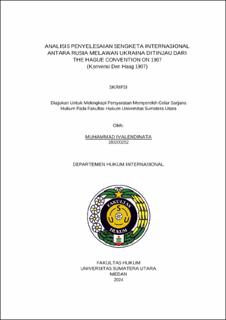Analisis Penyelesaian Sengketa Internasional antara Rusia Melawan Ukraina Ditinjau dari The Hague Convention on 1907 (Konvensi Den Haag 1907)
Analysis of International Dispute Resolution Between Russia and Ukraine Reviewed from The Hague Convention on 1907 (1907 Hague Convention)

Date
2024Author
Ivalendinata, Muhammad
Advisor(s)
Sutiarnoto
Rosmalinda
Metadata
Show full item recordAbstract
The conflict between Ukraine and Russia regarding Crimea which resulted in the reunification of Crimea with Russia is a form of International Armed Conflict. Based on the Geneva Conventions in Articles two to four of the Geneva Convention, it is found that the definition of International Armed Conflict can be applied to all cases where war is declared or an armed conflict occurs between two or more parties. The problem formulation in this thesis is: 1) How to resolve international disputes peacefully according to International Law, 2) How to analyze dispute resolution between Russia and Ukraine in terms of the 1907 Hague Convention, 3) How to resolve disputes between Russia and Ukraine from a legal perspective International.
The method used in this thesis research is a normative juridical research method, which is supported by primary data obtained through literature study, and analysis carried out using qualitative analysis.
The research results found that international dispute resolution arrangements according to International Law are based on Article 38 paragraph (1) of the Statute of the International Court, which recognizes various sources of law as the basis for dispute resolution. In the context of the dispute between Russia and Ukraine, the 1907 Hague Convention and Article 2 paragraph (3) of the UN Charter emphasize the necessity of peaceful resolution of disputes. However, dispute resolution efforts should involve the UN Security Council, in accordance with Article 39 Chapter VII of the UN Charter, which gives the Security Council the authority to determine threats to peace or acts of aggression. Although the UN Security Council has an important role in observing, advising, and acting to maintain international security, the complexity in the jurisdictional linkages between the UN Security Council and the International Criminal Court (ICC) means that decisions regarding the crime of aggression are influenced more by international political and security considerations than by international criminal considerations. objective law.
Collections
- Undergraduate Theses [3138]
